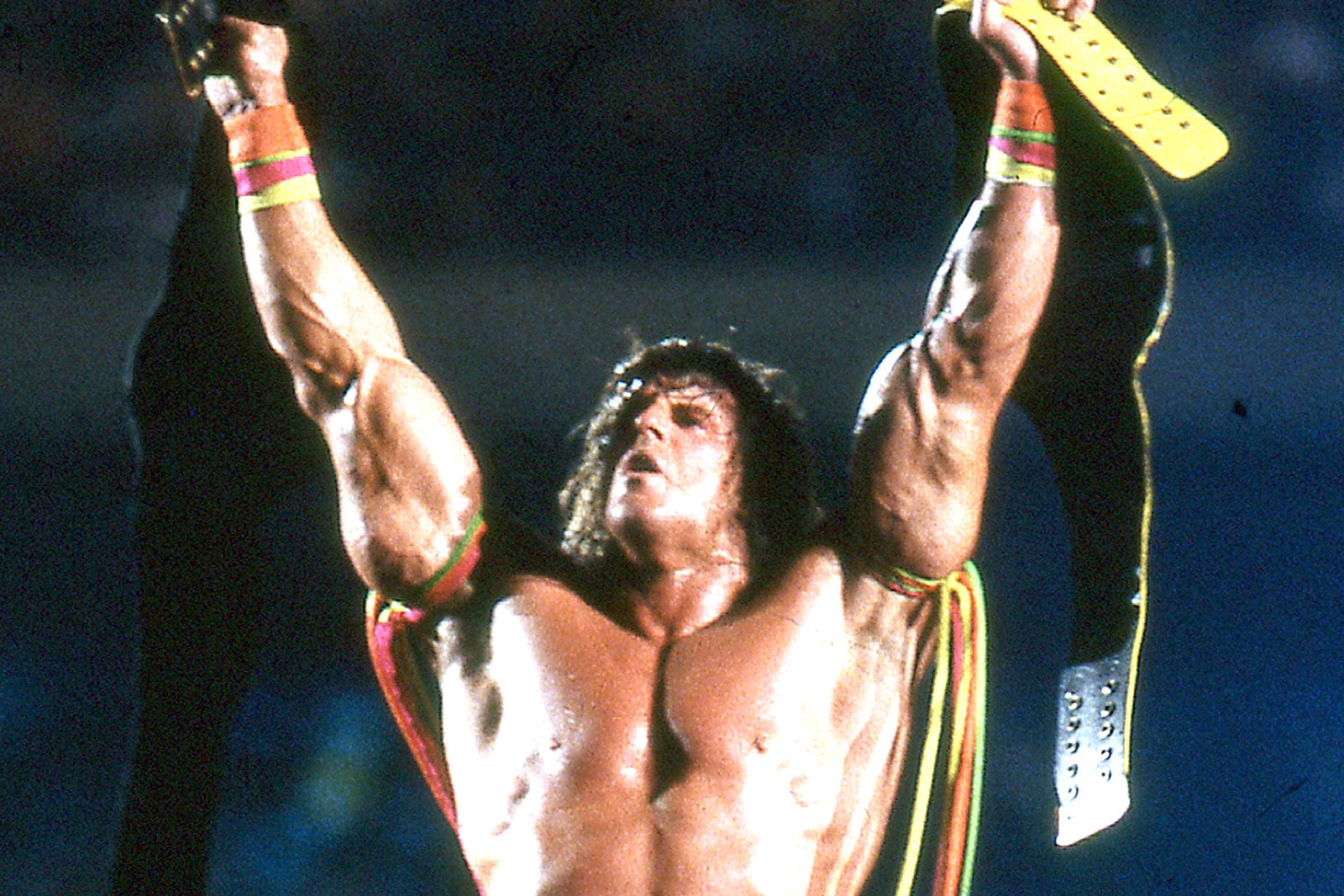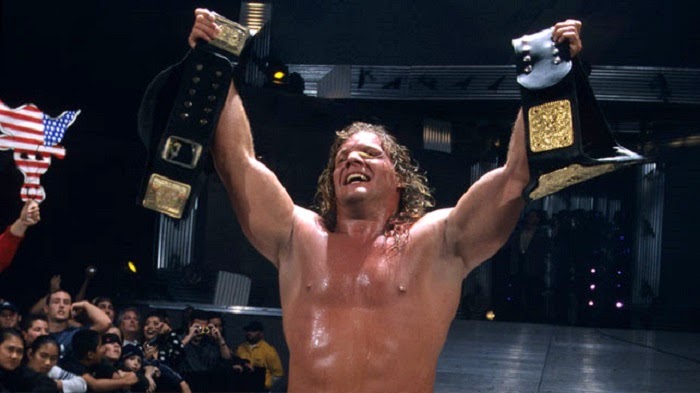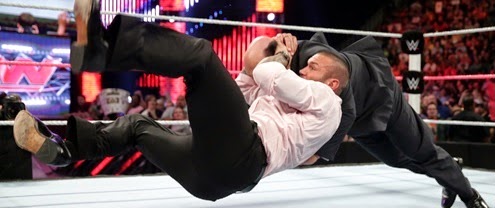Currently in WWE the World Heavyweight Champion Brock Lesnar
makes fewer public appearances than Bin Laden did before his demise. As such
the main belt is void of screen time, an act that threatens to devalue it. The
second tier titles, the United States and Intercontinental championships,
should have been used to cover the gap. Instead these once illustrious titles
have been floundered further by WWE creative. It used to be so different. It
used to be so much better.
Regardless of storylines and the characters involved, during
the boom periods of sports entertainment championship gold meant everything.
The gravitas of results revolved around which side of a rivalry ended the night
with a belt held aloft. From the dawn of the new brand of wrestling, sports
entertainment as we now know it, in the 80s, personalities that transcended the
ring and fell into popular culture came into being. Characters like Hulk Hogan
and the Ultimate Warrior. Their defining moment came at the start of 1990 when
WWF champion, Hogan, faced the Intercontinental Champion, The Warrior, at Wrestlemania VI.
What added to the bout, one already soaked in electricity,
was the two main titles. It was like a pro-wrestling unification bout, the type
only seen before in boxing rings. Hard to call, a unique chance to see the two
great titles face off. The belts weren’t an added gimmick, they were revered and
desired. They made a win all the more credible. Of course, Warrior triumphed that
night, vacated the I/C title, but not before holding both belts high above his
head with pride.
Moving through the 90s the titles still had great value. So
much so that Vince screwed Bret (or Bret screw Bret, depending on your take) to
keep his main belt from appearing on WCW television. An era when the WWF Womens
Championship was dumped in a bin on WCW Nitro by Medusa, a shock at the time, a
title that disappeared without fanfare. Before that The British Bulldog
defeated Bret Hart for the Intercontinental Title in a packed-out Wembley
Arena. That was when 90,000 Brits believed it was a belt worth holding.
Nowadays it’s a tool to place a ceiling on the mid-card.
Back then belts were an extension of a performer’s power, a
visual representation that validated them, never better emphasised than when Ric Flair brought the Big Gold Belt from WCW to WWF. Now they feel like awkward
afterthoughts. Something the WWE hates to accommodate but does so to shift kids’
replica merchandise. The last time they had genuine importance was after the
Invasion storyline. They went to great lengths to enforce how important
championship gold was. They had, after all, just bought WCW’s history; they had
to drive home how important each championship aspect was. It culminated in
belts becoming unified, separated, and unified some more.
For example, Chris Jericho became the first unified champ by
holding the WWF belt and WCW world heavyweight title. That became the unified
belt and then singular WWF title again. Due to the brand extension they soon
brought the big gold belt back, in doing so it saw the I/C title, US title,
European Championship and the Hardcore Championship all being unified, across a
period of time from Survivor Series 2001 to No Mercy 2002, into the World
Heavyweight Championship. The US and I/C titles did re-emerge at Judgement Day
2003, but by then the stage had been set to devalue the once highly regarded
belts.
Recently we saw the World Heavyweight Championship – the Big
Gold Belt’s ghost title – unified again, this time by Randy Orton. WWE tried to
remind us the great lineage of both titles, successfully reminding us how
mistreated all the current titles have been in recent years. Now Lesnar holds
the belt without making any appearances
for months. I’m all for the main belt having reduced screen time. It makes it
feel more special. But an absence of one month is enough. One PPV, tops. Never
more than this. It should be defended at every monthly event that requires
subscribers to pay more or headlines the network during that period. Now the
WWE World Heavyweight Title doesn’t feel special, it feels unnecessary.
In its absence the secondary titles could have been used to
fill the void. It was a great chance to return their former value. The higher
mid-card could have evolved to the main event scene, like Warrior did with his
I/C title in 1990. With the I/C title becoming the new top title, the US champ
could have become a good number two, like the Intercontinental title of years
gone by.
Instead we witnessed Sheamus holding the belt without ever
really defending it. It was prop, not authentic. And Ziggler went on a losing
streak while holding I/C gold. Even though he was the holder of such an
illustrious title, there was no way WWE creative could allow him to overcome
Seth Rollins. In doing so they told the viewers that the I/C champ was good,
but not that good. That a higher
level existed beyond the title.
To enforce this, Ziggler himself overcame the
current holder, Luke Harper, this week on Smackdown. Telling us that Ziggler is
now in the top group. The Intercontinental Championship should be validation of
the top group by them holding it, not by the champ jobbing to them. Top tier and
the upper mid-card shouldn’t face off on regular programming, especially to the
detriment of titles. Only Rusev holding the US title has stemmed the tide for now.
The WWE needs to address its current title problem. It’ll
take time but the long term benefits are worth the efforts required to
restructure its current stance. Would a ladder match for the I/C title tomorrow
have the same aurora as Shawn Michaels vs Razor Ramon did? No. And it’s not for
a lack of talent, but the title has zero importance now. Does anyone actually
care who the WWE Champion is now? No. And it’s not because WWE lacks main event
star power. Better titles creates bigger buzz around PPVs. Prestige on the belt
gives holders a step closer to immortality, and instant validation with the WWE
Universe.
A competition without a main prize isn’t sport at all. It’s
not even entertainment.








